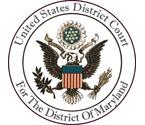Julie Rubin
2022 - Present
2
Julie Rubin is a judge on the United States District Court for the District of Maryland. She was nominated by President Joe Biden (D) on November 3, 2021, and confirmed by a 51-46 vote of the U.S. Senate on March 23, 2022.[1][2] To see a full list of judges appointed by Joe Biden, click here.
The United States District Court for the District of Maryland is one of 94 U.S. District Courts. They are the general trial courts of the United States federal courts. To learn more about the court, click here.
Rubin was an associate judge on the 8th Judicial Circuit for Baltimore City in Maryland. She was appointed to the court by Governor Martin O'Malley (D) on December 28, 2012, and assumed office on January 9, 2013.[3][4][5] She left this position after her confirmation to the U.S. District Court for the District of Maryland.
Judicial nominations, appointments, and elections
United States District Court for the District of Maryland (2022-present)
- See also: Federal judges nominated by Joe Biden
On November 3, 2021, President Joe Biden (D) nominated Rubin to the United States District Court for the District of Maryland.[6] She was confirmed by a 51-46 vote of the U.S. Senate on March 23, 2022.[7] Rubin received commission on March 30, 2022.[8] To read more about the federal nominations process, click here.
| Nominee Information |
|---|
| Name: Julie Rubin |
| Court: United States District Court for the District of Maryland |
| Progress |
| Confirmed 140 days after nomination. |
| Questionnaire: Questionnaire |
| Hearing Transcript: Hearing Transcript |
| QFRs: QFRs (Hover over QFRs to read more) |
Confirmation vote
The U.S. Senate confirmed Rubin by a vote of 51-46 on March 23, 2022.[7] To see a full breakdown of the vote on the official U.S. Senate website, click here.
| Rubin confirmation vote (March 23, 2022) | |||||||||
|---|---|---|---|---|---|---|---|---|---|
| Party | Yea | Nay | No vote | ||||||
| 45 | 0 | 3 | |||||||
| 4 | 46 | 0 | |||||||
| 2 | 0 | 0 | |||||||
| Total | 51 | 46 | 3 | ||||||
Senate Judiciary Committee hearing
The Senate Judiciary Committee held hearings on Rubin's nomination on December 15, 2021. The committee voted to advance Rubin's nomination to the full Senate on January 20, 2022.
Nomination
On November 3, 2021, President Joe Biden (D) nominated Rubin to the United States District Court for the District of Maryland.[6]
Rubin's nomination was returned to the president at the sine die adjournment of the U.S. Senate on January 3, 2022.[9] The president renominated Rubin on the same day.[2]
Rubin was nominated to replace Judge Ellen Hollander, who announced she will assume senior status once her replacement is confirmed.[1]
The American Bar Association rated Rubin Well Qualified with one recusal.[10] To read more about ABA ratings, click here.
Maryland's 8th Judicial Circuit (2013-2022)
See also: Maryland judicial elections, 2014
Rubin ran for re-election to the 8th Judicial Circuit.
Primary: Rubin won in the Democratic primary on June 24, 2014, receiving 12.9% of the vote. Other candidates in the race included Page Croyder and judges Melissa K. Copeland, Philip Senan Jackson, Alfred Nance, Christopher L. Panos, Melissa Marie Phinn, and Jeffrey M. Geller. Rubin cross-filed as a Republican and won in the primary, receiving 12.7% of the vote.
General: Rubin was unopposed in the general election on November 4, 2014. Seven seats were up for election.[11][12][13]
Education
Rubin received a B.A., cum laude, from Mount Holyoke College in 1995 and a J.D. from the University of Maryland School of Law in 1998.[6]
Career
- 2022-present: Judge, United States District Court for the District of Maryland
- 2013-2022: Associate judge, 8th Judicial Circuit for Baltimore City
- 2000-2013: Astrachan Gunst Thomas Rubin, P.C., Baltimore, Maryland
- 2005-2013: Partner
- 2000-2005: Associate
- 1998-2000: Associate, Shapiro & Olander, P.A., Baltimore, Maryland[4][6]
Awards and associations
Awards
- 2011: Very Important Professional, The Daily Record
- 2010: Top 50 Women in Maryland Under 40, The Daily Record[4]
Associations
- Member, American Bar Association
- Member, Federal Bar Association
- Member, Maryland State Bar Association
- Member, City Bar Association
- Member, Women's Bar Association of Maryland
- Adjunct Professor, University of Maryland School of Law
- Board of Trustees, Bryn Mawr School
- Board of Directors, CollegeBound Foundation
- Member, Maryland Society for the Prevention of Cruelty to Animals (SPCA)
- Member, Baltimore Metropolitan Chapter, Simon E. Sobeloff Law Society
- Member, Legal Committee, Baltimore Neighborhoods, Inc.[4]
About the court
| District of Maryland |
|---|
| Fourth Circuit |

|
| Judgeships |
| Posts: 10 |
| Judges: 9 |
| Vacancies: 1 |
| Judges |
| Chief: George L. Russell, III |
| Active judges: Deborah Boardman, Theodore Chuang, Stephanie A. Gallagher, Lydia Kay Griggsby, Brendan Hurson, Matthew Maddox, Julie Rubin, George L. Russell III, Paula Xinis Senior judges: |
The United States District Court for the District of Maryland is one of 94 United States district courts. When decisions of the court are appealed, they are appealed to the United States Court of Appeals for the Fourth Circuit based in downtown Richmond, Virginia, at the Lewis F. Powell Federal Courthouse.
The District of Maryland has original jurisdiction over cases filed within its jurisdiction. These cases can include civil and criminal matters that fall under federal law.
There are two court divisions, each covering the following counties:
The Baltimore (Northern) Division, covering Allegany, Anne Arundel, Baltimore, Baltimore City, Caroline, Carroll, Cecil, Dorchester, Frederick, Garrett, Harford, Howard, Kent, Queen Anne's, Somerset, Talbot, Washington, Wicomico, and Worcester counties
The Greenbelt (Southern) Division, covering Calvert, Charles, Montgomery, Prince George's, and St. Mary's counties
To read opinions published by this court, click here.
The federal nomination process
Federal judges are nominated by the president of the United States and confirmed by the Senate. There are multiple steps to the process:
- The president nominates an individual for a judicial seat.
- The nominee fills out a questionnaire and is reviewed by the Senate Judiciary Committee.
- The Senate Judiciary Committee holds a hearing with the nominee, questioning them about things like their judicial philosophy, past rulings or opinions, etc.
- As part of this process, the committee sends a blue slip to senators from the home state in which the judicial nomination was received, allowing them to express their approval or disapproval of the nominee.
- After the hearing, the Senate Judiciary Committee will vote to approve or return the nominee.
- If approved, the nominee is voted on by the full Senate.
- If the Committee votes to return the nominee to the president, the president has the opportunity to re-nominate the individual.
- The Senate holds a vote on the candidate.
- If the Senate confirms the nomination, the nominee receives a commission to serve a lifelong position as a federal judge.
- If the Senate does not confirm the nomination, that nominee does not become a judge.
See also
- United States District Court for the District of Maryland
- United States Court of Appeals for the 4th Circuit
External links
- Search Google News for this topic
- Biography from the Federal Judicial Center
- United States District Court for the District of Maryland
- United States Court of Appeals for the 4th Circuit
Footnotes
- ↑ 1.0 1.1 Congress.gov, "PN1356 — Julie Rebecca Rubin — The Judiciary," accessed November 4, 2021
- ↑ 2.0 2.1 Congress.gov, "PN1505 — Julie Rebecca Rubin — The Judiciary," accessed January 5, 2022
- ↑ The Daily Record, "Nazarian appointed to appellate court; Hughes to chair PSC," December 28, 2012
- ↑ 4.0 4.1 4.2 4.3 Maryland State Archives, "Baltimore City Circuit Court, Julie R. Rubin Biography," accessed June 26, 2014
- ↑ Maryland State Archives, "Baltimore City Circuit Court, Maryland Judicial Branch," accessed June 26, 2014
- ↑ 6.0 6.1 6.2 6.3 The White House, "President Biden Names Ninth Round of Judicial Nominees," November 3, 2021
- ↑ 7.0 7.1 U.S. Senate Press Gallery, "Wednesday March 23, 2022," accessed March 23, 2022
- ↑ Federal Judicial Center, "Rubin, Julie Rebecca," accessed April 1, 2022
- ↑ Under Senate Rule XXXI, paragraph 6 of the Standing Rules of the Senate, pending nominations are returned to the president if the Senate adjourns sine die or recesses for more than 30 days.
- ↑ American Bar Association, "RATINGS OF ARTICLE III AND ARTICLE IV JUDICIAL NOMINEES 117TH CONGRESS," Last Updated: December 14, 2021
- ↑ Maryland State Board of Elections, "2014 Primary Election State Candidates List," accessed March 21, 2014
- ↑ Maryland State Board of Elections, "Primary Ballot, Baltimore City," accessed March 30, 2014
- ↑ Maryland State Board of Elections, "2014 Official Primary Election Results," accessed October 3, 2014
Federal courts:
Fourth Circuit Court of Appeals • U.S. District Court: District of Maryland • U.S. Bankruptcy Court: District of Maryland
State courts:
Maryland Supreme Court • Maryland Court of Appeals • Maryland District Courts • Maryland Circuit Courts • Maryland Orphans' Court
State resources:
Courts in Maryland • Maryland judicial elections • Judicial selection in Maryland
